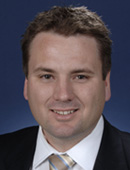
While he grew up dreaming of playing test cricket on the big stage of the MCG on Boxing Day, federal member for Mayo Jamie Biggs has found Parliament House in Canberra to be his true calling.
Briggs, 35, became one of the youngest ever advisors to fellow cricket-lover and Prime Minister John Howard. This gained him pre-selection for the seat of Mayo.
‘I learnt an enormous amount working around a very smart, capable team that was brilliantly lead by the Prime Minster himself,’ says Briggs, reflecting on his early days in politics.
Briggs’ story is not a common one. From growing up in Mildura and moving to Adelaide with dreams of a cricket career, Briggs focus shifted to politics very rapidly: ‘I didn’t come through the young liberals, like a lot of people through university. I became more interested and decided I should join to get involved, and that’s what I did.’
From there, Briggs was flung into the deep-end of politics. Working with South Australian treasurer Rob Lucas in 2001, it was be only two more years before Briggs would be advising a senior minister. In 2006, he was appointed to a senior advisers role in the prime minister’s office for industrial relations.
‘It exposes you to politics at its most intense level, where the interaction between the politics and the policy is a daily task. It’s very fast moving, and teaches you to look at the issues in depth, but also in a timely political manner,’ he said.
Following the Howard government’s defeat in 2007, and Alexander Downer’s retirement, Briggs was elected to parliament winning the 2008 by-election in Mayo. He faced stiff opposition from Greens candidate Lynton Vonow, who campaigned for tougher regulation to help save the Murray River.
‘Half the Lower Lakes are my electorate, and people are always concerned about them. I think I’ve fought pretty hard for their perspectives on that issue for some time since I’ve been elected,’ he said.
His victory in 2008 was narrow, and the Lower Lakes have proven to be a decisive issue in his career. Briggs has placed himself at odds with his leader, Tony Abbot, over plans for the river. He stated in a letter that: ‘The Murray-Darling Basin cannot continue to be Australia’s food bowl unless the amount of water taken from it is sustainable.’ Abbott has refused to support any kind of sustainability plan.
Briggs’ expertise, however, is in economics. ‘I’m an economic liberal, in the sense that I think we should regulate the economy to the lowest possible level,’ he says.
Briggs was part of the team that set up the notorious WorkChoices system.
‘No one in the Liberal Party wants to return to WorkChoices. We all agree that the removal of the no-disadvantage test (the nub of WorkChoices) went too far,’ wrote Briggs in a piece for The Advertiser in Adelaide late last year.
As far as the future of Liberal’s workplace reform: ‘Tony Abbot has made a commitment that there will be a strong policy at the next election. I guess everyone will have to wait and see exactly what that says.’
Briggs’ current parliamentary responsibilities include an appointment to the expenditure review committee (ERC).
‘The pink bats example cost a billion dollars to begin with and a billion dollars to fix the ongoing problem. We say they spent too much on school halls in the second stimulus package, there was quite a substantial amount of waste in that too,’ he says.
The ERC is a major component in the Liberal Party’s ongoing attack on Labor.
‘Unsurprisingly there are always savings that you can find if you look hard enough, and that’s what our task is,’ Briggs says.
This appointment has gained some attention in the media, particularly from The Australian’s Peter Van Onselen. He thinks that Briggs’ full capabilities are not being utilised, and that he is ‘central to the future of the party’.
‘As long as I think I’ve got something more to contribute I’ll continue to run for election,’ says Briggs. And with his economic expertise and solid political grounding, he looks set to be an integral part of the Liberal party.
But Briggs remains pragmatic about the realities of a political career. ‘At the moment I feel like I’ve achieved what I can achieve. If that changes, I’ll make way for someone else. That’s what politics is all about,’ says Briggs.
‘You need people with passion who want to make a difference and chase that eternal desire of all Australians to leave our country better for the next generation than what they found it.’
Callum Glennen is a journalism student at La Trobe University. You can follow him on Twitter: @callum_glennen
To view profiles of some of the other backbenchers as part of upstart’s Backbench Insiders project, click here.






